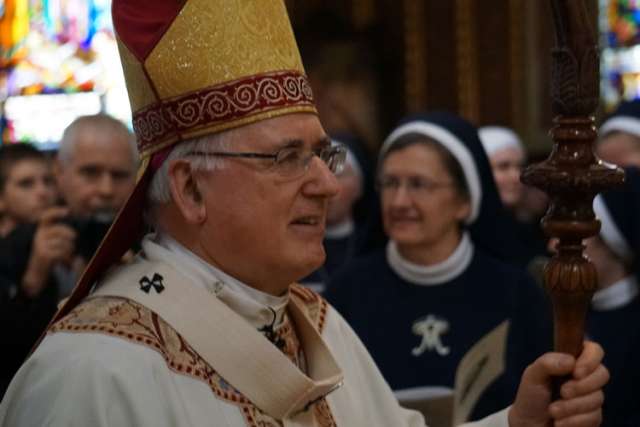If Liberal Leader Justin Trudeau is setting limits as to who can belong to his party, the Catholic Church also sets limits on who belongs to the Church, Prendergast said.
The Catholic Church “expects adherence” to her teachings, because she believes they are “the teachings of Christ,” he said. “The teachings of Christ are not just for me; they are for the good of everyone.”
“Respect for life of the innocent child in the womb and also of the person at the end of his or her life is part and parcel of the Gospel,” he said.
The archbishop said he would not go so far as to advise Trudeau to no longer receive communion without meeting with him beforehand. He thinks that after Trudeau’s public statements a meeting would be “a good idea.”
“I don’t think you can make a judgment about someone’s faith position simply by what is said in the public,” he said. “There needs to be a meeting with myself, or with his parish priest, a priest who is in harmony with the Church’s teachings.”
Trudeau is a resident of Ottawa so canonically, as a Catholic, he belongs to the Ottawa archdiocese, he said. He is, however, from Montreal.
“I would respect a wish to consult with the Archbishop of Montreal (Archbishop Christian Lépine) if he wished, or with a priest that would be acceptable to the Archbishop of Montreal or myself,” Prendergast said.
Catholics are warned against taking the sacrament of Holy Communion unworthily, both in Scripture and in Canon Law section 915 which says: “Anyone aware of having committed a grave sin is obliged to refrain from receiving Communion without first obtaining absolution in the sacrament of Reconciliation.”
“We always have to presume the best of people unless we know for sure the interior state of their lives,” the archbishop said. “Someone might be in a state of sin when they come to Holy Communion, but I don’t know that.
I have to presume that person is right before God unless there are evident signs that’s not the case.
“If there are persistent signs of a resistance to hold the Church’s teachings, there would seem to be an incompatibility between what the Church understands and what the person is professing,” he said. “But no one from the beginning presumes to judge a person’s conscience.”
The Ottawa archdiocese issued a statement May 16 on moral issues and communion with the Catholic Church in response to Trudeau’s statements.
“A person who takes a position in contradiction to the teaching of the Catholic Church on the value and dignity of human life from the moment of conception to the moment of a natural death, and persists in this belief, is not in communion with the Church’s values and teaching, which we believe faithfully transmit for today the teachings of Christ,” said the statement, which includes an extensive quote from Pope Francis’s Evangelii gaudium that says the “defence of unborn life is closely linked to the defense of each and every other human life.”
“One may not dissent from these core teachings on life issues and be considered a Catholic in good standing,” the statement says.
The archbishop said he issued the statement because there was a big reaction from local area Catholics wondering “what we are going to do about it.”
Trudeau has in the past said his Catholic faith is important to him and he told the Ottawa Citizen May 16 about how his father Pierre Trudeau “went to church every Sunday, read the Bible regularly to us, and raised us very, very religious, very Catholic.”
“I take him at his word,” Prendergast said. “I wonder whether he has struggled with the conscience issues that his faith, if he’s true to it, would require.”
Trudeau’s statements “bring to the fore the role of our faith in public life,” said Prendergast. “We can’t simply put our faith under a bushel basket. We have to let it shine forth so people can see it.”
Prendergast pointed out the issue of abortion is not only one of concern to Catholics, but to Muslims, Sikhs, people of other religions and even atheists who understand scientifically when life begins.
Trudeau seems to represent opposition to abortion as religious when it’s “really an ethical, moral and philosophical difference,” he said.
Canadians have lost a lot of confidence in their political leaders because conscience is no longer stressed as important.
“If we keep shunting conscience aside, it’s no wonder we see the kind of behaviour that needs to be constantly corrected by new regulations.”


